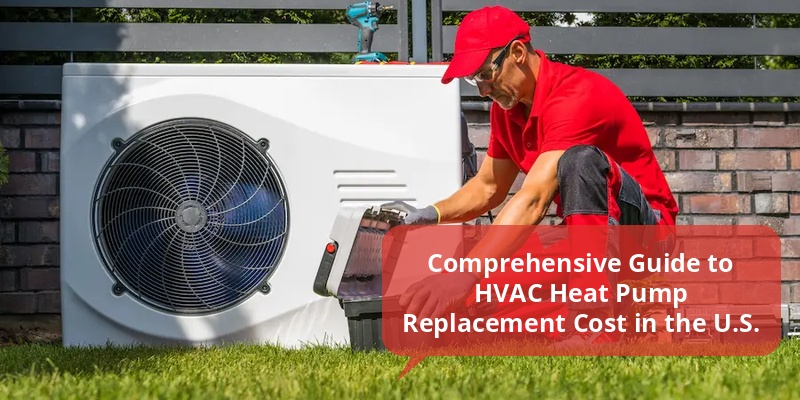Replacing an HVAC heat pump is a significant investment that homeowners in the U.S. often face to maintain efficient and comfortable home climates. Understanding the HVAC heat pump replacement cost involves more than just the price tag—it includes installation, system size, energy efficiency, and regional factors. This article explores the detailed costs and considerations that impact your heat pump replacement, helping you make an informed choice.
| Cost Factor | Typical Price Range |
|---|---|
| Basic Unit Price | $3,000 – $7,000 |
| Installation Costs | $1,500 – $4,000 |
| Total Replacement Cost | $4,500 – $11,000 |
| Energy Efficiency Upgrades | Additional $500 – $2,000 |
| Average Lifespan | 10-15 Years |
Factors Influencing HVAC Heat Pump Replacement Cost
Several variables determine the overall cost of replacing a heat pump in an HVAC system. The most influential include:
- Heat Pump Size and Capacity: Larger homes require higher-capacity units, increasing the price.
- Energy Efficiency Ratings: Units with higher SEER (Seasonal Energy Efficiency Ratio) and HSPF (Heating Seasonal Performance Factor) ratings typically cost more but offer long-term savings.
- Installation Complexity: Older homes or specialized ductwork may require additional modifications, increasing labor costs.
- Geographical Location: Installation prices vary by region based on labor costs and climate demands.
- Brand and Model: Premium brands carry higher upfront costs but often deliver better performance and reliability.
Average Cost Breakdown for Heat Pump Replacement
| Cost Component | Price Range | Description |
|---|---|---|
| Heat Pump Unit | $3,000 – $7,000 | Price varies by model size and efficiency rating. |
| Labor and Installation | $1,500 – $4,000 | Includes removal of old unit, setup, and testing. |
| Additional Parts | $300 – $1,000 | Thermostats, wiring, and duct repairs as needed. |
| Permits and Inspection | $100 – $300 | Required by many states for HVAC installations. |
Energy Efficiency and Its Impact on Replacement Cost
Modern HVAC heat pumps come equipped with advanced energy efficiency technologies. Higher-efficiency models carry a greater initial investment but can significantly reduce monthly heating and cooling bills. For example, upgrading from a unit with a SEER rating of 13 to one rated 20+ can reduce energy consumption substantially.
Choosing an ENERGY STAR® certified heat pump entitles homeowners to potential rebates and tax credits, offsetting part of the replacement cost. This makes efficient units not only environmentally responsible but economically prudent over time.
Installation Challenges That Affect Costs
Heat pump installation varies widely depending on the home’s existing HVAC infrastructure. Some common challenges include:
- Replacing outdated ductwork: Ensuring compatibility with new heat pumps can add $1,000 to $3,000 to the project.
- Electrical upgrades: Older electrical panels might need enhancements to support the heat pump’s electrical load.
- Accessibility: Difficult installation sites or large multi-story homes require more labor time.
Proper installation is critical to maximize heat pump performance and lifespan, making it worthwhile to invest in skilled HVAC technicians despite higher labor costs.
How to Save on HVAC Heat Pump Replacement Costs
Homeowners can take several steps to manage heat pump replacement expenses effectively:
- Get Multiple Quotes: Comparing bids from different licensed contractors helps identify fair market pricing.
- Schedule Replacement Off-Season: Prices tend to be lower in spring or fall when demand is reduced.
- Utilize Incentives: Federal, state, and utility rebates for energy-efficient heat pumps can provide substantial savings.
- Consider Financing Options: Many HVAC companies offer financing plans with low or zero interest to spread out costs.
Typical Lifespan and Long-Term Cost Considerations
Heat pumps generally last between 10 and 15 years. Over time, repairs and efficiency loss can increase operational costs. Replacing a heat pump with an updated, energy-efficient model often leads to:
- Lower utility bills due to improved energy usage.
- Reduced repair frequency and maintenance costs.
- Enhanced home comfort with better temperature control and quieter operation.
Comparing Heat Pump Replacement with Other HVAC Options
When considering replacing an HVAC heat pump, evaluating alternatives can help homeowners choose the best fit. Options include:
| System Type | Initial Cost | Energy Efficiency | Suitability |
|---|---|---|---|
| Heat Pump Replacement | Moderate to High | High (especially with newer models) | Best for moderate climates with cooling and heating needs |
| Central Air Conditioner & Furnace | High | Variable | Suitable for colder climates requiring dedicated heat source |
| Ductless Mini-Split Heat Pump | High | Very High | Ideal for homes without ductwork or single-room solutions |
Regional Variations in Heat Pump Replacement Costs Across the U.S.
Costs can differ significantly depending on regional climate and labor markets. For example:
- Southern states: Often require larger cooling capacity, possibly increasing unit size and cost.
- Northern states: Heating demand can push homeowners toward heat pumps with better cold-weather performance, sometimes at higher prices.
- Urban vs. rural areas: Urban locations typically have higher labor costs due to demand and overhead.
Importance of Professional Assessment Before Replacement
Before deciding on heat pump replacement, conducting a thorough HVAC system assessment is essential. A certified technician will evaluate:
- Current system condition and efficiency
- Home insulation and ductwork integrity
- Compatibility of new heat pump models with existing infrastructure
- Potential energy savings and payback periods
This professional insight helps avoid unnecessary costs and ensures optimal system selection tailored to the home’s specific needs.
